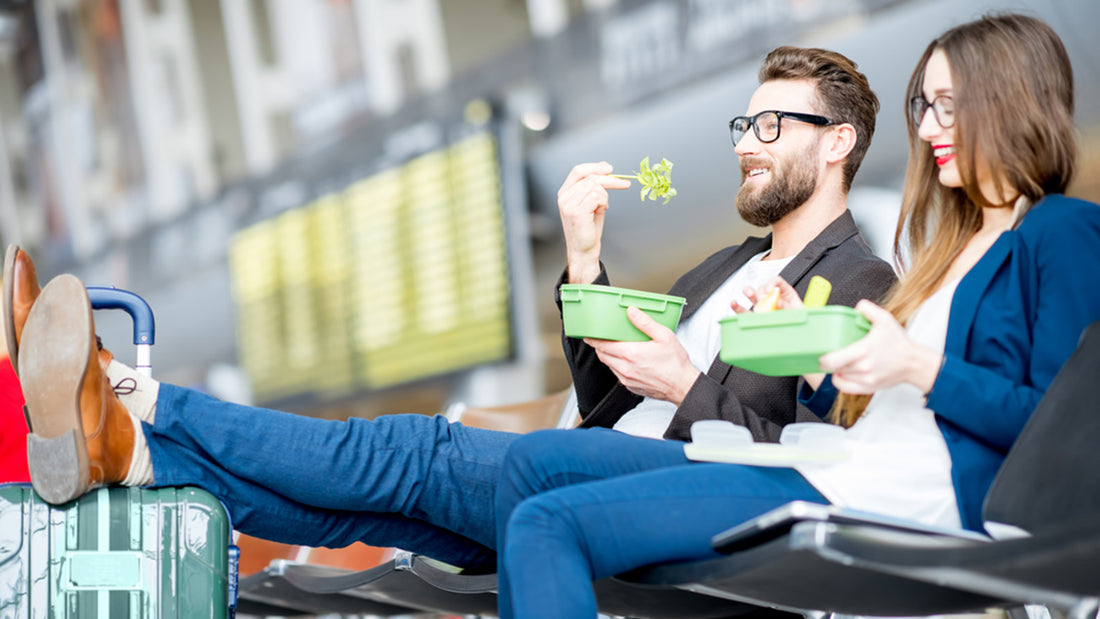
A survey of millennials done by Hilton Hotels & Resorts revealed that 44 percent gained weight during business trips. Maintaining healthy habits can be challenging enough when you’re at home, but when a business trip or other type of travel is added to the mix, maintaining a healthy diet, sleep schedule, and exercise routine can be even more difficult. That doesn’t mean it’s impossible, though!
You want to stay healthy, which means eating a healthy diet. How do you do that? By making it a priority to eat well! You may read this and think it’s easier said than done, and in a way, you’re right. A survey reported in Forbes tells us that 44 percent of professionals are more likely to indulge in unhealthy foods while on business trips than they would be at home. As soon as you travel, eating healthy is the first thing you drop from your life. It doesn’t need to be this way! Following a few tips is all it takes to go from eating healthy when it’s convenient to living a healthy lifestyle every single day, no matter where you are.
Tip #1 Pack smart for your trip
No, this doesn’t just mean remembering enough socks and clean underwear for your trip. You want to pack healthy food, too! Fresh fruits, hard boiled eggs, nuts, trail mix, protein bars, cheese sticks, and pre-cooked lean meats are all simple to toss in your suitcase or carry-on bag. More than likely, the hotel you’ll be staying in has a small fridge. If not, stick to the non-perishables. When you have these healthy options on hand, you’re much less likely to grab a donut on your way through the lobby.
Tip #2 Be cautious of restaurant portion sizes
You don’t want to skip breakfast. When your mom told you it was the most important meal of the day, she was right! That being said, it’s important to understand that eating three restaurant meals a day is really more like eating six meals a day. For most people, three full restaurant-sized portions are far too much for a day's caloric intake. You can ask for lunch portions, which are about half the dinner portion, or order from the appetizer menu at dinner. If you get a full dinner entree, save half of it for breakfast the next day.
Tip #3 Make sure you’re drinking enough water
You’re out of your normal routine, which may mean drinking less water than you normally do at home. Many times, when you feel hungry, you’re actually thirsty. This can lead to overeating when what's really needed is more water. In order to prevent this, it's important to drink water throughout the day.
Tip #4 Don’t overindulge in alcohol
Both vacations and work trips lend themselves to drinking more than you would at home. This isn’t recommended for two reasons. Number one, all alcohol has calories, so you’re adding to your daily intake. When you’re inebriated, you’re much more likely to order a big hamburger and french fries than a sensible salad. If you want to treat yourself, have a drink, but limit yourself.
Tip #5 Treat yourself
Moderation is what’s important, not being overly strict with yourself. Traveling is going to offer you a lot of food options, possibly some you’ve never had before or don’t often have the opportunity to eat. Not allowing yourself to eat something because it’s technically not the healthiest option will only make you crave it more and deny you of the chance of experiencing something new. If there’s something you really want, allow yourself that experience and consider making up for it elsewhere. For instance, if you really want to eat authentic Italian Tiramisu, make sure you’re reaching your step goals for the day. Skip the french fries at lunch because you know you’re going on a Napa Valley Wine Tour in the evening. You can make healthy choices without ruining your trip!
Tip #6 Get a full night of sleep
Did you know that you eat more when you’re tired? Sleep plays a vital role in good health, which is why it’s one of the Three Pillars of Healthy Living. Sleep helps maintain a healthy balance of the hormones that make you feel hungry (ghrelin) or full (leptin). When you don't get enough sleep, your level of ghrelin goes up, and your level of leptin goes down. This makes you feel hungrier than when you're well-rested. When you’re “running on empty” you’re much more likely to choose a meal high in carbs and sugar over a garden salad or soup.
According to the same study done by Hilton Hotels & Resorts, people who travel frequently for work have more challenges maintaining a healthy lifestyle than those who don't. You probably didn’t need an official research study to tell you that. You know it from your own life. With travel back, the struggle is back again too. Whether you’re able to once again able to visit your favorite little Parisian bistro once again, make it to the satellite office on the other coast, or stay at your elderly parents’ home in Florida, you are overjoyed to be able to pack up and be on the move again. After over a year of staying at home and being isolated, it is a wonderful feeling to travel again.
These tips are a fantastic way to keep yourself on track with your healthy living goals. By following this advice, you are much more likely to follow through on your healthy living goals each and every day, whether you’re in your normal routine, heading out of town for business, or finally getting a much-needed vacation. Good luck; we’re rooting for you!

